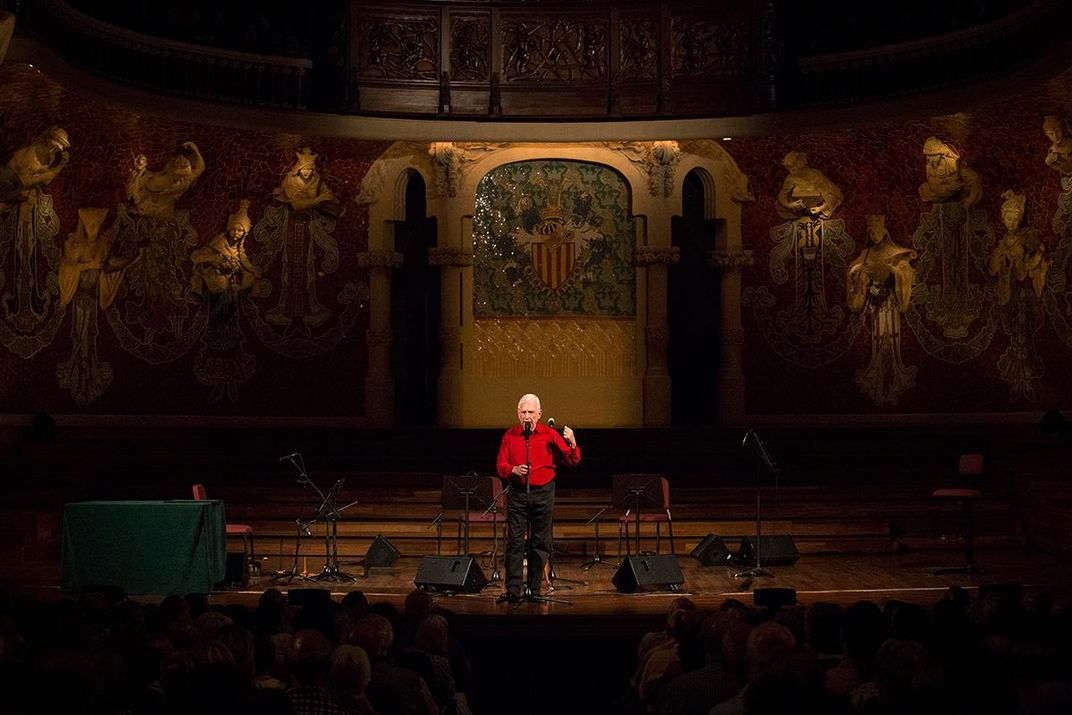This Catalan Folk Singer Refused to Bow to Oppression
The director of the Smithsonian Center for Folklife and Cultural Heritage recognizes the lifetime work of the singer activist Raimon
/https://tf-cmsv2-smithsonianmag-media.s3.amazonaws.com/filer/07/fd/07fd63bc-1f56-4b25-a718-13d99d004cd3/fw054101web.jpg)
At a concert this weekend in Barcelona, the 76-year-old Catalan folksinger Raimon poured out with a new urgency and vigor the lyrics from his famous song “I Come From a Silence.”
“I come from a silence
That is old and very long,
From people who keep standing up
From the bottom of the centuries…”
In fact, Raimon is performing to full houses every weekend at the stately Palau de la Música Catalana, a World Heritage Site designed in the spectacular curvilinear modernista style. Although the apex of Raimon’s career was in the 1970s, he is still filling concert halls with his robust vocal performances. With a quartet accompanying him on his guitar, he quietly announces the title of each song, and his audience—more than two thousand people of all ages—sits in rapt attention. They are there to pay homage, to share in these last moments, a final farewell to this legendary artist. With these last concerts, Raimon is announcing his retirement. As the only Catalan singer on the Smithsonian Folkways Recordings label, we had the pleasure of recognizing his lasting contributions, honoring him with a lifetime achievement award at his concert on May 12.
In 1963, Raimon won the People’s Prize in the Fifth Mediterranean Song Festival in Barcelona for a lyrical love song in Catalan titled “She’s Left,” which he performed with the songstress Salomé. Barcelona was then under the rule of a Spanish dictator, and the use of the Catalan language was discouraged and sometimes illegal.
When asked to sing in Catalan, Raimon said he would do so in “the spirit of service to my language and my country.” To sing in his language, Raimon was taking a grave risk.
For 36 years, General Francisco Franco had ruled Spain with an iron fist. From 1939 until his death in 1975, Franco cemented his power, outlawing political parties and sentencing thousands of Spanish citizens to death or into forced labor camps. Under the Franco regime, a strict policy of Spanish nationalism prevailed and all cultural activities and regional traditions were suppressed.
With his 1963 performance, Raimon solidified his position as the leading voice in the New Song Movement in Spain, a global protest effort that fought social injustice, oppression and political dictatorships with song. The simple instrumentation and direct voices became outlets to condemn political oppression. Poetic lyrics reminded people of atrocities, rallied them to protest, and urged active participation in social change. Elements of traditional folk songs validated the region's marginalized culture.
Raimon’s songs addressed the pervasive violence and fear that bolstered Franco’s power and influence. The dictator’s censors soon began to harass Raimon, refusing him the right to release certain songs, prohibiting his performances, or limiting what he could sing.
Raimon, however, fiercely insisted on his right to express himself, and did he sing!
The timbre of his strong, expressive voice and the poetry of his lyrics captured the imagination of a generation. In 1971, Folkways Recordings released the album Raimon: Catalonian Protest Songs, and in the liner notes, Pete Seeger wrote: “Censors, in every corner of this world, tend to be shallow, literal-minded people. Raimon is a poet. There is no need to say more.”

In time, the poet became a folk hero. Raimon spoke truth when many others dared not. He publically challenged the dictator when few would. He crossed regional and class lines to elegantly express the views and values of a community of people for whom Catalan was a beloved language, their language.
Like others in the New Song Movement around the world, he used local elements from the past to contest the dictatorship and articulate a clear vision of hope for the future.
Many of Raimon’s songs allude to silence, as the repression of Franco’s dictatorship marked his life and oeuvre.
Repeatedly the censors forbade him to speak, sing or appear. But Raimon persisted.
At its heart, traditional culture revolves around expression. Communities keep expressive culture alive to remind themselves of their origins, their histories and their direction in the future. Individuals use traditional cultural forms to comment upon what is happening around them. Cultural and artistic expression provided a principal avenue to understand and communicate the most important aspects of our common humanity.
To silence this communication is a violation of our sense of who we are as people, while to allow it is a simple but powerful act of freedom. As Raimon says in his song “Against fear”:
“Let us start calling things by their names.
If we do not break the silence,
We shall all die in the silence.”
/https://tf-cmsv2-smithsonianmag-media.s3.amazonaws.com/accounts/headshot/Mason_Michael-12012.jpg)



/https://tf-cmsv2-smithsonianmag-media.s3.amazonaws.com/accounts/headshot/Mason_Michael-12012.jpg)